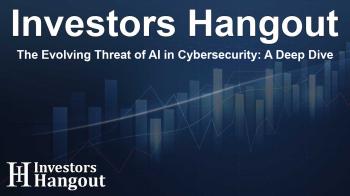The Evolving Threat of AI in Cybersecurity: A Deep Dive

Understanding the AI-Driven Cybersecurity Landscape
In the rapidly evolving world of technology, artificial intelligence (AI) has emerged as a double-edged sword, bringing both innovation and risk. Recently, Check Point Software Technologies Ltd. (NASDAQ: CHKP), recognized as a global leader in cybersecurity, unveiled an intriguing report that dives into the intersection of AI technology and cybercrime. This comprehensive analysis reveals how malicious actors have begun to exploit AI tools and techniques to facilitate their activities.
The Unseen Threat of AI-Enhanced Cybercrime
As industries increasingly adopt AI, the nuances of authenticity in the digital realm are fading. Check Point's report outlines the stark reality that cyber criminals are leveraging AI to craft sophisticated impersonations and deepen the methods of deception available in the virtual space. Recognizing that AI technologies can create exceptionally convincing fakes—from emails to audio—should be a priority for anyone navigating the internet.
The Role of Generative AI in Cybercrime
Generative AI, particularly through large language models (LLMs), enables cybercriminals to orchestrate complex attacks that can easily deceive even the most well-guarded systems. For instance, hackers can generate realistic phishing emails and deepfakes, which can lead unsuspecting individuals into traps. This not only compromises personal safety but poses a significant threat to sensitive corporate data as well.
Case Studies Highlighting AI Misuse
Check Point highlights numerous instances where AI has been used for illicit gains. One noteworthy example includes a case where attackers mimicked the voice of a government official using AI-generated audio technology. Such developments showcase the potential for AI-driven impersonation to create chaos and distrust in digital identity verification processes.
Identifying Vulnerabilities in AI Usage
Understanding how these technologies can be misused is essential for making informed decisions regarding cybersecurity policies. The report isolates four significant areas in which AI-generated deception manifests:
- AI-Driven Impersonation: Threat actors employ AI to fabricate highly realistic communication, from emails to synthetic audio and deepfake videos, leading to a breakdown of trust across digital identities.
- Data Manipulation and Disinformation: Malicious entities can feed AI systems with false training data, creating outputs threatened by disinformation, which significantly undermines the integrity of information systems.
- Creation of Advanced Malware: Cyber criminals utilize AI to develop and enhance malware, automating attacks such as Distributed Denial of Service (DDoS) while improving the efficiency of data theft.
- Exploitation of AI Models: Gaining unauthorized access to AI model databases, criminals can build custom AI tools that facilitate hacking and fraud.
Defending Against AI-Powered Threats
As the landscape of threats evolves, it is crucial for cybersecurity measures to be adjusted accordingly. Check Point encourages organizations to adopt frameworks that incorporate AI as a central element in their defense strategy.
Proactive Security Approaches
Some immediate strategies include using AI for detection of anomalies, enhancing identity verification processes to adapt to new impersonation tactics, and equipping security teams with AI-enhanced threat intelligence tools. The integration of AI in defense strategies not only ensures a more robust response to attacks but also helps anticipate and mitigate potential threats before they materialize.
A Future of AI in Cybersecurity
As cyber threats continue to adapt and evolve, so too must our defenses. The insights provided by Check Point highlight that it is imperative for cybersecurity teams to act swiftly in adopting integrated AI solutions to safeguard organizational infrastructures. Embracing AI in defense mechanisms is not merely a recommendation but rather a requirement in today's digital environment.
Frequently Asked Questions
What is the AI Security Report by Check Point?
The AI Security Report provides an in-depth analysis of how AI technology is being weaponized by cybercriminals and outlines strategies for defenders to counteract these threats.
How has AI impacted cybersecurity?
AI has introduced vulnerabilities by enabling advanced impersonation techniques and creating highly convincing fakes, which complicate trust in digital communications.
What strategies can organizations implement to defend against AI threats?
Organizations can leverage AI for threat detection, enhance identity verification processes and develop AI-aware cybersecurity frameworks to stay ahead of attackers.
What should companies be aware of regarding AI-generated content?
Companies must recognize that AI-generated content can be manipulated for deceitful purposes, making traditional verification methods inadequate.
How can Check Point help organizations with cybersecurity?
Check Point provides advanced cybersecurity solutions that help protect organizations by utilizing AI technologies to secure infrastructures effectively and efficiently.
About The Author
Contact Dylan Bailey privately here. Or send an email with ATTN: Dylan Bailey as the subject to contact@investorshangout.com.
About Investors Hangout
Investors Hangout is a leading online stock forum for financial discussion and learning, offering a wide range of free tools and resources. It draws in traders of all levels, who exchange market knowledge, investigate trading tactics, and keep an eye on industry developments in real time. Featuring financial articles, stock message boards, quotes, charts, company profiles, and live news updates. Through cooperative learning and a wealth of informational resources, it helps users from novices creating their first portfolios to experts honing their techniques. Join Investors Hangout today: https://investorshangout.com/
The content of this article is based on factual, publicly available information and does not represent legal, financial, or investment advice. Investors Hangout does not offer financial advice, and the author is not a licensed financial advisor. Consult a qualified advisor before making any financial or investment decisions based on this article. This article should not be considered advice to purchase, sell, or hold any securities or other investments. If any of the material provided here is inaccurate, please contact us for corrections.

